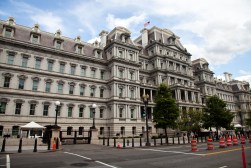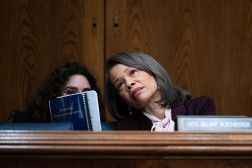What role should government play in setting a ‘vision’ for AI innovation?

With the creation of a White House Select Committee on Artificial Intelligence in May, the Trump administration unveiled its philosophical approach to AI innovation: The United States should lead the world, and the way to get there is by keeping any regulations at bay.
“We didn’t roll out the red tape before Edison turned on the first lightbulb. We didn’t cut the lines before Alexander Graham Bell made the first telephone call,” U.S. Deputy CTO Michael Kratsios said in his remarks at the select committee kickoff meeting. The unknown, he argued, “is no excuse for preemptive government intervention.”
Even so, there are important roles the government can play in helping to shape the future of this technology, panelists said at a Wednesday morning Politico event.
The government, the diverse group agreed, can and should aid in the creation of a national AI strategy, continue investing in early-stage AI research and work to foster international norm cooperation.
“Very similar to the way the United States kind of responded to Sputnik with kind of a national strategy around building the space program… I think that would be very, very useful right now,” said Rep. John Delaney, D-Md.
Technological competitors like China and others have a strategy, and the U.S. also needs to set out its “vision” and goals around AI. The government certainly has a role in helping to craft this approach, he said.
Walter Copan, director of the National Institute of Standards and Technology and a leader on the White House AI committee, said there are a “series of roles” that are “appropriate” for the government to hold in this area. First, he said, the government should sponsor early-stage research and development through government grants.
Rep. Will Hurd, R-Texas, agreed that investing in early-stage research is key. When it comes to the global race to AI dominance, he said, “the best case scenario is that we’re tied [with China].” The way to change that is to invest in research and “unlock data,” he said.
Second, Copan said, the government can use its convening power to find “synergy” between private sector and public sector actors — something the select committee arguably exists to create. Rashida Richardson, director of policy research for the AI Now Institute, offered one note of criticism on the select committee — while it includes government, industry and academia, she said, it does not yet include civil society groups. The diverse privacy, security and bias issues that AI brings up, she argued, indicate that civil society groups should have a seat at the table.
Dean Garfield, president and CEO of the Information Technology Industry Council, added that the federal government can also help lead international agreement on AI standards. Given all the work that countries around the world are currently doing, “it is an opportune time,” he said, to decide on what “the rules,” so to speak, should be.
“When the U.S. shows leadership on this, then that sets a framework for the rest of the world,” Hurd said.
Collectively, Delaney said, governments, the private sector, civil society groups and even individual citizens have a journey of choices ahead. “We’re not going to go to bed one night and wake up in the ‘Terminator’ movie,” he said, to laughter in the room. But the investment and regulation and collaboration decisions we make, he added, will have an impact on what kind of world we do wake up to.






